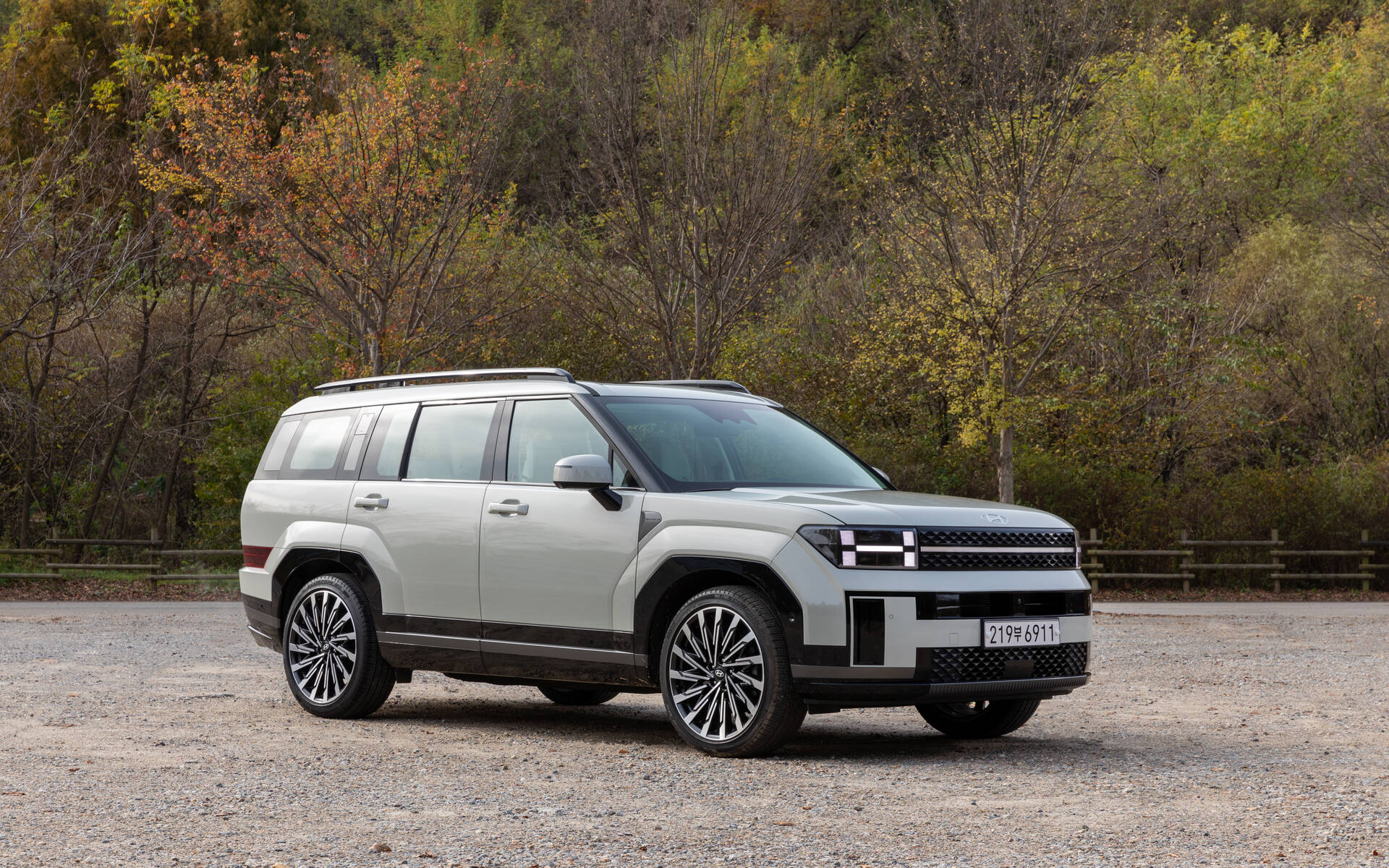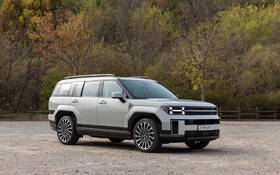2024 Hyundai Santa Fe: Form Follows Function

| Strong points |
|
|---|---|
| Weak points |
|
Seoul, South Korea—The fifth-generation 2024 Hyundai Santa Fe makes quite a splash with a radical transformation that includes boxy, Land Rover-like styling and third-row seats as standard equipment. The available powertrain options are carried over from its predecessor, but the larger exterior dimensions result in a roomier, more versatile cabin.
Our very first driving experience with this new Santa Fe took place on the highways and country roads of South Korea, and we got to spend time with both the hybrid variant and its more powerful turbocharged counterpart.
- Also: Boxy 2024 Hyundai Santa Fe is One Step Closer to a Dealer Near You
- Also: Hyundai Reveals More Details About the 2024 Santa Fe
Despite the extremely angular body, aerodynamics are actually improved. Hyundai engineers told us the Santa Fe’s drag coefficient is now 0.29, down from 0.33. How is that possible? Well, they used lessons from the company’s electric vehicles, such as active grille shutters, and applied them to the midsize SUV. For the record, the 2024 model is 4.83 metres long (+4.5 cm) and its wheelbase is 5 cm longer.
Other exterior highlights include sculpted wheel arches, super-large side windows, a huge rear liftgate and new H-shaped headlights and taillights. In fact, the “H” motif is applied to the interior, as well, more specifically on the seats and air vents.

Inspired by the IONIQ 6
Inside, the driver faces a panoramic curved display encompassing the 12.3-inch digital gauge cluster and 12.3-inch infotainment system, very much like what you’ll find in the IONIQ 6 electric sedan. Touch-sensitive HVAC controls are integrated at the bottom of the centre stack. The Santa Fe also offers two wireless smartphone chargers, wireless Apple CarPlay and Android Auto connectivity, as well as multi-console storage space that can be opened by either front or rear passengers.
In front of the co-driver are dual glove boxes, with the upper one offering a UV-C sterilization compartment for frequently used items such as cell phones, wallets, glasses and more). There’s plenty of space and excellent visibility all around. Upper trim levels add a digital rear-view mirror that makes it even easier to see what’s behind the vehicle, especially when a rear passenger sitting in the middle happens to be in the way.

Speaking of which, we found no reason to complain about comfort or visibility in the second row. Stadium-style seating is a clever arrangement. As for the new third-row seats, they will suit children but not adults, which is often the case with similar midsize SUVs.
Standard Hybrid Powertrain
The naturally aspirated 2.5-litre four-cylinder engine has been discontinued, but the real surprise is this: base 2024 Santa Fe models in Canada will be motivated by a hybrid system pairing a turbocharged 1.6-litre gasoline engine with an electric motor and a six-speed transmission. Combined output is rated at 232 horsepower along with 271 lb-ft of torque, allowing 2,000 lbs of towing. On our watch, the Santa Fe Hybrid achieved 6.7 L/100 km in a mix of highway and suburban driving.
Santa Fes using the turbocharged 2.5-litre four-cylinder engine deliver 277 horsepower and 311 lb-ft. of torque through an eight-speed dual-clutch transmission. The one we tested managed 8.8 L/100 km in similar driving conditions. Max towing capacity is increased to 3,500 lbs—or 4,500 lbs in the case of the more rugged XRT model.

Performance is fine if you stick with the gas-electric combo, but the turbo-four is clearly a better fit for the bulkier and heavier 2024 Santa Fe, which weighs nearly two full tons. Handling is safe and the ride is pleasantly smooth and quiet, but don’t expect to feel anything special behind the wheel. If you want to have fun, get yourself a Mazda CX-50, which leads all competitors in that department.
Santa Fe Hybrid production will take place in South Korea, while models featuring the 2.5T engine will be built in Montgomery, Alabama. The latter will go on sale first, sometime in March 2024, while the hybrid units will arrive a few months later.
No Santa Fe PHEV for Canada
In Europe and other global markets, the new Hyundai Santa Fe is also available with a plug-in hybrid powertrain. Alas, there are no plans to offer this one in Canada. Too bad, because the previous-generation Santa Fe PHEV proved to be a compelling option with just over 50 km of pure electric range.

Canadian customers will have a choice of five trim levels—Preferred, Trend, Luxury, XRT and Ultimate Calligraphy—each one more generously equipped than the next. Highway Driving Assist 2 is part of the package, with the top-line model even allowing automatic lane changes upon turn signal activation.
New Santa Fe XRT
Similar to the Palisade, the new 2024 Sante Fe gets a rugged model called XRT, which stands out with increased ground clearance, all-terrain tires, multiple black accents and many practical accessories. It’s Hyundai’s response to the Subaru Outback Wilderness and Mazda CX-50 Meridian, among others.
At the end of the day, the 2024 Hyundai Santa Fe will appeal to a number of families thanks to a much roomier and more versatile cabin with seating for up to seven. Pricing will be announced closer to launch at the end of winter, but considering the outgoing model ranged from $37,399-$46,699, we hope that Hyundai will try its best to maintain a base price under $40,000.











